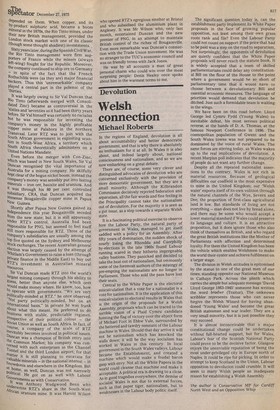Devolution
Welsh connection
Michael Roberts
In the regions of England, devolution is all about accountability and better democratic government, and that is why there is absolutely no 'enthusiasm for it at all. In Wales it is also about, and indeed largely about, national consciousness and nationalism, and so we are now embarking on a great debate. There are, of course, some very clever and distinguished advocates of devolution who are concerned exclusively with the provision of more democratic government, but they are a .small minority. Although the Kilbrandon Commission decisively rejected federation and separatism, all the fair words and fine feeling in the Principality cannot take the nationalism out of devolution. For the majority it is seen as a gut issue, as a step towards a separate Welsh state. It is a fascinating political exercise to observe how the Labour Party, the natural party of government in Wales, managed to get itself saddled with a policy for an Assembly. After fifty years of domination, the sudden shock of nearly losing the Rhondda and Caerphilly by-elections in the late 1960s found Labour running scared in their hitherto impregnable valley bastions. They panicked and decided to take the heat out of nationalism, but ominously some of the foremost authors of the strategy of pre-empting the nationalists are no longer in Parliament. Those who sold the pass have lost their seats. Central to the White Paper is the electoral miscalculation that a vote for a nationalist is a vote for nationalism. It is the application of this miscalculation to electoral results in Wales that is the origin of the proposals for a Welsh Assembly, proposals which can be traced to the terrible vision of a Plaid Cymru candidate hoisting the flag of victory over the abject form of Michael Foot in Ebbw Vale, surrounded by the battered and tawdry remnant of the Labour machine in Wales. Should that day arrive it will not be nationalism which has knocked the walls down; it will be the way socialism has worked in Wales in this century. In local government in the South Wales valleys, Labour became the Establishment, and created a machine which would make a feudal baron gasp with envy. Not all the White Papers in the world could cleanse that machine and make it acceptable. A political era is drawing to a close. As in good tragedies everywhere, the demise of socialist Wales is not due to external forces, such as that paper tiger, nationalism, but to weaknesses in the Labour body politic itself. The significant question today is, can the establishment party implement its White Paper proposals in the face of growing popular opposition, not least among their own grass roots rank and file? Even the Labour Party could not count on support if the price that had to be paid was a step on the road to separatism. Not surprisingly, the opponents of devolution are quietly confident that the White Paper proposals will never reach the statute book. It is widely accepted that a team of skilled parliamentarians could delay any constitution al Bill on the floor of the House to the point
.where a government would he so short of parliamentary time that it would have to
choose between a devolutionary Bill and essential economic measures. The language of priorities would demand that devolution be ditched. Just such a formidable team is waiting in the wings.
We have been on this road before. Lloyd George led Cymru Fydd (Young Wales) to inevitable defeat, his most serious political reverse, at the hands of D. A. Thomas, at the famous Newport Conference in 1896. The cosmopolitan population of Gwent and the South Wales towns was not prepared to be dominated by the voice of rural Wales. The same forces are stirring today, as Wales wakes up to the real implications of devolution. A recent Marplan poll indicates that the majority of people do not want any further change.
Despite all the repeated nationalist assertions to the contrary, Wales is not rich in material resources. Because of geological difficulties our coalfield is the most expensive to mine in the United Kingdom; our 'Welsh water' exports itself of its own volition through the natural channels of the Wye, Severn and Dee; the proportion of first-class agricultural land is low. But standards of living are not everything — man does not live by bread alone, and there may be some who would accept a lower material standard if Wales could preserve its language and culture. It is an attractive proposition, but it does ignore those who also think of themselves as British, and who regard the great British institutions like the Mother of Parliaments with affection and determined loyalty. For them the United Kingdom has been the vehicle which enables Welshmen to make the world their oyster and achieve fulfilment on a larger stage.
The division in Welsh attitudes is epitomised by the statue to one of the great men of our times, standing opposite our National Museum in Cathays Park. Across the plinth which carries the simple but adequate message 'David Lloyd George 1863-1945' someone has written the word bradwr (Traitor). The unknown scribbler represents those who can never forgive the Welsh Wizard for having abandoned 'Young Wales' and become the great British statesman and war leader. They are a very small minority, but it is just possible they may succeed.
It is almost inconceivable that a major constitutional change could be undertaken without full-hearted support, but for Wales, Labour's fear of the Scottish National Party could prove to be the decisive factor. Glasgow enjoys the unenviable reputation of being the most under-privileged city in Europe north of Naples. It could be ripe for picking. In order to attempt to keep Scotland in the Union, Labour opposition to devolution could crumble. It will seem to many Welsh people an inadequate reason for establishing a Welsh Assembly.
The author is Conservative MP for Cardiff North West and an Opposition Whip


































 Previous page
Previous page